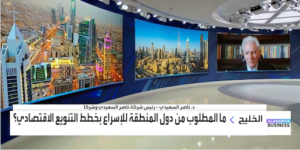Dr. Nasser Saidi’s comments (posted below) on the potential for the GCC-China Free Trade Agreement and beyond, appeared in the article titled “Why a China-GCC free trade agreement might be a game changer” on The National dated 3rd February 2023.
Nasser Saidi, president of Nasser Saidi & Associates and former chief economist of the Dubai International Financial Centre, says an FTA could be signed as early as this year.
“The China-GCC FTA negotiations have been ongoing since 2004. While it has taken a long time, agreements have been reached on most trade-related issues,” says Mr Saidi, who also previously served as Lebanon’s minister of economy and industry and deputy governor of the country’s central bank.
“This is the last mile for negotiations, and considering [the] GCC’s plans to increase economic diversification, the agreement is likely to focus beyond just oil, [and] into trade [and] services (including digital), tech sectors and both portfolio and direct investments.”
Chinese President Xi Jingping’s historic visit to Saudi Arabia in December heralds a “major shift” in the strategic relationship between China and the GCC.
“President Xi’s visit will give a strong impetus and I anticipate an initial FTA could be signed in 2023,” says Mr Saidi.
Mr Saidi says trade between the GCC and China has been steadily rising and doubled between 2010 and 2021, with China accounting for about 16.7 per cent of the Gulf region’s total trade in 2021.
Mr Saidi says an FTA would open new sectors such as services, technology, artificial intelligence and robotics, and strengthen linkages in infrastructure, transport and logistics, leading to a “potential doubling of non-oil trade in three years”.
Opportunities also exist in construction, manufacturing, tourism and space exploration, as well as the linking of financial markets, he says.
While China is a big export market, Mr Saidi sees many opportunities beyond trade and investment. “First and foremost, there could be significant benefits from the adoption of the PetroYuan,” he says. “Oil could continue to be priced in USD, but payment and settlement would be in Yuan. The Yuan could be used for all bilateral trade with only the net balance settled in euro or USD.”
Deeper economic ties mean that China and the Gulf region can benefit from increased co-operation on numerous fronts such as the integration of banking and payment systems, the expansion of central bank swap agreements, collaboration between special economic zones and state-owned enterprises becoming an instrument of economic and industrial policy. “Sovereign wealth funds can also be used as an instrument for co-operation — for example GCC SWFs can focus more of their portfolios on Asian economies, especially China, and vice versa,” says Mr Saidi. “In parallel, China will emerge as a geostrategic partner of the GCC in defence and security, given alignment on most political issues.”





